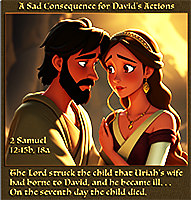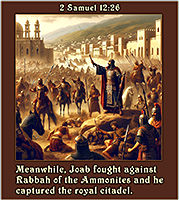2 Samuel 12:15–31 . . . Bible Study Summary with Videos and Questions
“David and Bathsheba’s Son Dies”
After becoming King of Israel, things went very well for David, perhaps too well. God had given him success in all his hearty efforts. Like Israel of old, David appeared to momentarily forget that his success was the result of God’s grace, not a tribute to his efforts alone. Starting in chapter 11, David’s arrogance has begun to increase and will continue to do so as the coming chapters will document.
For David, it was all over after that one night of self-indulgence with Bathsheba, as detailed in our summary of 2 Sam. 11:1–27. He didn’t need or want another wife; he didn’t even appear to want an affair, just a night of pleasure. But God had other plans. Bathsheba conceived and eventually sent word to David that she was pregnant. When David’s efforts to deceive Uriah (and the people) into thinking Uriah had fathered this child, he had Uriah killed in battle with Joab’s help. After she’d mourned for her husband, David brought Bathsheba into his home, taking her as his wife.
Clearly, what David had done displeased God who’d give David no rest or peace until he’d come to see his sin for what it was and repented of it. After some period of distress (see his Psalm 32:3–4), God had Nathan tell David a parable (highlighted in our previous summary of 2 Sam. 12:1–14) that deeply upset David who’d become furious. He insisted that the parable’s &“rich man who stole the poor man’s pet lamb” deserved to die! Nathan then stopped David in his tracks, saying, “You are the man!” (12:7). As David heard Nathan’s recital of his sin, he broke, declaring to Nathan, “I have sinned against the Lord” (12:13a).
Interestingly, Nathan’s response to David’s confession was both comforting and disturbing. Although he deserved to die for his sins, David wouldn’t because God had taken away his sin (12:13b). What a relief those words must have been for David to hear. But what followed would pierce him through: the son who David’s sin had produced would die. It’s David’s response to the death of this son that we’ll focus on today.
[Note: Click the link to This Week’s Passage near the bottom of this page to read today’s Scripture.]
The Death of One Child (2 Samuel 12:15–23)
“The Lord struck the child that Uriah’s wife had borne to David, and he became ill.” This is hard for many to accept. Sadly, often the innocent are made to suffer because of another’s guilt. Since the sickness came immediately after the words of Nathan the prophet, it was seen as having come from God. This was far more tragic for David and Bathsheba than it was for the unnamed child. Their infant son suffered for several days; we may trust that God’s comfort was extended to the child in the midst of suffering. At the end of his suffering the child might well have gone to eternal glory. Though it died, the chastisement was really upon David and Bathsheba, not the child.
It was after Nathan left David that God struck the child born to David and Uriah’s widow. We don’t know what the malady was, but we know that after seven days the child died. David had mourned when Saul and Jonathan died in battle (2 Sam. 1), when Abner was killed by Joab (2 Sam. 3), and when Nahash the Ammonite king died (2 Sam. 10). His mourning here, however, wasn’t a mourning over the death of his son (for he hadn’t yet died), but was instead a “mourning of repentance.” This was a sign of his repentance while beseeching God to spare his son’s life.
David was certainly right in his assumption that the life of this child was in God’s hands, and that his best course of action was to appeal to God to spare the child’s life. David believed in the sovereignty of God, thus resting his case with God. His prayers weren’t only an expression of his repentance, but the exercise of his faith. Believing in God’s sovereignty didn’t keep David from taking action (by fasting and praying); it was his faith that prompted him to act. He prayed for the child’s recovery, lying on the ground (v. 16). In spite of David’s sorrow, sincerity, and persistence in petitioning God to spare the child’s life, his request was denied. The child died. However, when God took its life, David knew that the time for praying was over. The child died seven days after the Lord struck it (v. 18). So David would probably have seen the child’s death as an act of God, rather than a normal death, since the Jews associated seven days with divine acts, such as the Creation.
You’ll find no support in this passage or anywhere else in Scripture for praying for the dead. And evidently, the child died nameless, since the Israelites usually named their babies on the eighth day after their birth, when they circumcised their boy babies. David’s servants apparently believed that he’d become hysterical with grief when he learned the child had died (v. 19). Therefore, they were afraid to tell him that his child was dead, for they thought, “While the child was still living, we spoke to David but he would not listen to us. How can we tell him the child is dead? He may do something desperate” (v. 18).
It’s what happens next that perplexed David’s servants. While the child was ill they hadn’t been able to get David up from the ground or eat any food (v. 17). They assumed it would only get worse when he learned that his child died. Instead, David arose from the ground, washed and anointed himself, changed his clothes, and went into the house of the Lord, where he worshiped. When he had finished worshiping God, he came home and asked for food. When they set it before him, he ate it. Seeing this, the servants were amazed and puzzled.
David’s “worship” (v. 20a) consisted of his accepting God’s judgment, submitting to God’s will, and not becoming bitter or retaliatory over God’s treatment. This shows that David’s extraordinary prayer-and-fasting effort was answered. He had a sense of peace when the child died, knowing he did all he could to seek God’s mercy in a time of chastisement. The ability to worship and honor God during trials or crises is a wonderful demonstration of spiritual confidence.
The fact that “he ate” (v. 21) shows that he went on with his life; he didn’t show displeasure with the LORD by morbidly dwelling on the child’s death. King David might have referred to the grave or to heaven, when he said, “I shall go to him . . .” (v. 23); some commentators believe that David meant that he’d see his child in the future life. In context, the issue was the inevitability of death, not what happens after death: that the child couldn’t come back to life, but David would someday join him in death. Scripture is silent on the eternal state of dead infants, but we can find great comfort in knowing that the Judge of all the earth will do right (Genesis 18:25). In this summary’s closing paragraphs, you can learn more about what the Bible says about when a child dies.
David’s unusual responses might be explained as such: (1) The death of this child came as no surprise to David because it had already been foretold by Nathan who’d explained to David the reason for the child’s death; (2) David’s mourning during the child’s sickness was an act of repentance, not the mourning of the loss of a loved one; (3) the death of this child was accepted as God’s final answer to David’s petitions for the child’s life; (4) David was comforted by the fact that what he asked for (and was denied) came as a result of God’s grace.
These four reasons alone are a sufficient basis for David’s actions in our text. But there’s yet one more thing we’re told, which will be further revealed in this summary’s closing paragraphs: David found consolation and comfort in the death of the child because he likely felt that, although the child couldn’t return to life and be with him, he’d go to heaven and find his child there (v. 23). David might have meant to say this in that verse: I can’t bring the child back to life, to be here with me once again. But I can look forward to being with this child in heaven, after I die.
The Birth of Another Son (vv. 24–25)
The birth of David and Bathsheba’s second son, “Solomon” (whose name comes from the Hebrew word shalom, which means peaceable or peaceful), was a blessing from the LORD. It demonstrates and reinforces the fact that God’s grace is greater than all our sins. Solomon had another name, “Jedidiah” (lit. “Beloved of Yahweh”; compared with “David,” whose name means “Beloved”). “Jedidiah” was perhaps a throne name that David had given him to anticipate his reigning as king. It may indicate that David felt that God was now at peace with him.
Solomon was born about 991 BC. The fact that God allowed him to live — and even made him David’s successor on the throne — is testimony to God’s great grace to David (cf. Romans 5:20). The statement, “The LORD loved him” (v. 24b), is the Hebrew way of saying the LORD chose him. God had previously revealed to David that He’d give him a son, that he should name him “Solomon,” and that this son would succeed David on his throne (1 Chronicles 22:6–10). David’s son Solomon succeeded him as king and later built the temple of the Lord that David had dreamed of building. Ultimately, Jesus Christ was born as a descendant of David (Matthew 1:1), providing a fulfillment of prophecy and bestowing the greatest possible honor to King David.
David Is Again Victorious (vv. 26–31)
The closing verses detail how David achieved victory over the city of Rabbah, the capital of the Ammonites. After Joab’s successful siege, he sent word to David that the city was on the verge of falling and invited him to come finish the conquest so David would receive the honor. David gathered all the troops, went to Rabbah, attacked, and captured it. Throughout the battle effort, Joab struggled for more than a year to conquer that Ammonite city; the victory came only when David got things right with God. There was an unseen spiritual reason behind the delayed victory at Rabbah: It deals with sin.
You may have been surprised in life that occasionally, when you have sinned deliberately, God has blessed you shortly thereafter in some special way. Warning! In no way do such unwarranted blessings indicate God’s approval of your sin. However, it ought to show us his grace given to us in spite of our sin. It’s these outpourings of his goodness that ought to make us love him all the more and strengthen our resolve to stop displeasing him by rebelling against him (cf. the Prodigal Son in Matthew 18 and Luke 15).
Chapters 10—12 contain a very important revelation that can help us understand the complexity of God’s righteous ways. We often think too superficially about the way God deals with sin in our lives. We either tend to take sin too lightly, or we overestimate its devastating consequences, failing to see and adequately appreciate God’s grace. We should note in these three chapters that David’s great sins didn’t completely wash out his past record of godly behavior. God continued to bless him, in part because God had chosen him as his anointed, but also because he genuinely had a heart for God and usually sought to please God. David’s sins had terrible consequences, as we’ll see, but God didn’t reject David (cf. 2 Timothy 2:13) as a result. Perhaps the most important factor seems to be David’s basic heart attitude toward God. With it he was very different from Saul. It appears that David’s sins didn’t produce the same result as Saul’s. When David sinned, he confessed his sin. When Saul sinned, he made excuses (cf. Proverb 28:13).
When a Child Dies
Understandably, Christians who lose a child want assurance that their little one is safe in the arms of God. The Bible isn’t explicit about what happens to those who are too young to make a proclamation of faith. However, the Lord’s mercy upon them becomes clear when we look at Scripture. Over the years, many people have created unbiblical explanations for what happens to children who die. Some argue that salvation is available to some but not to others, which is scripturally untrue (John 3:16; 2 Peter 3:9). Also unsupportable (according to Dr. Charles Stanley) is the more complicated theory that God uses his foreknowledge to determine whether a child who dies will enter heaven or hell. The suggestion is that God rescues those who he knows would have grown up and been saved, but rejects the rest. What terrible uncertainty that would mean for family members left behind.
God doesn’t keep people guessing. What his Word teaches is that during the early years of life, a child doesn’t know how to choose good from evil (Deuteronomy 1:39; Isaiah 7:16) and therefore can’t be held responsible for his or her moral conduct. Accordingly, when a little one departs from life, the LORD is waiting with open arms. This theology makes biblical sense, given the Father’s character, desires, and plan.
Until a child is mature enough to decide about whether to follow and serve the LORD, he or she is safe from divine judgment. Our just and loving God doesn’t punish children for being too young to grasp their need of a Savior. The author of 2 Samuel 12:23 encourages us: Believers join their departed little ones in heaven.
† Summary of 2 Samuel 12:15–31
This passage describes the immediate and tragic consequence of David’s sin with Bathsheba. After Nathan’s rebuke and David’s confession, the Lord strikes the child conceived from David’s adultery with a severe illness (12:15–18). Despite David’s earnest fasting and pleading for the child’s life, the infant dies on the seventh day (vv. 19–23). This loss deeply grieves David but also highlights the seriousness of sin’s consequences even after forgiveness. Following the child’s death, David comforts Bathsheba, and she later bears another son, Solomon, whom the Lord loves and blesses (vv. 24–25). The chapter then shifts to recount further turmoil in David’s kingdom, including the defeat and death of Amaziah’s son in Edom, to which David responds by celebrating the Lord’s victory and bringing back the spoils to Jerusalem (vv. 26–31).
This passage emphasizes the complexity of divine justice and mercy in the aftermath of sin. While God forgave David (v. 13), the child’s death served as a sobering consequence, partly to uphold God’s justice and to prevent blasphemy from Israel’s neighbors, as Nathan earlier explained (v. 14). David’s genuine repentance and grief point to a heart seeking restoration despite the consequences. The birth of Solomon after this tragedy also sets the stage for God’s continued covenant promises through David’s line. The episode serves as a poignant reminder of how sin affects not only individuals but also relationships, families, and nations, while God’s mercy and plans endure beyond human failures.
Key points with verse references:
• The Lord struck David’s child with serious illness as a consequence of David’s sin (vv. 15–18).
• David fasts, pleads, and mourns deeply for his child during its illness (vv. 19–23).
• The child dies on the seventh day despite David’s intercession (vv. 18, 23).
• Bathsheba later bears Solomon, whom the Lord loves and establishes for Israel’s future (vv. 24–25).
• David responds to further military victories by bringing spoils to Jerusalem and worshiping the Lord (vv. 26–31).
This Week’s Passage
2 Samuel 12:15–31
New International Version (NIV) [View it in a different version by clicking here; also listen to chapter 12 narrated by Max McLean.]
Summary Video: “The Second Book of Samuel”
† Watch this introductory video clip created by BibleProject on bibleproject.com.
- Q. 1 Do you tend to take the sins you commit too lightly? If so, why?
- Q. 2 Do you overestimate your sins devastating consequences and fail to appreciate God’s grace?




